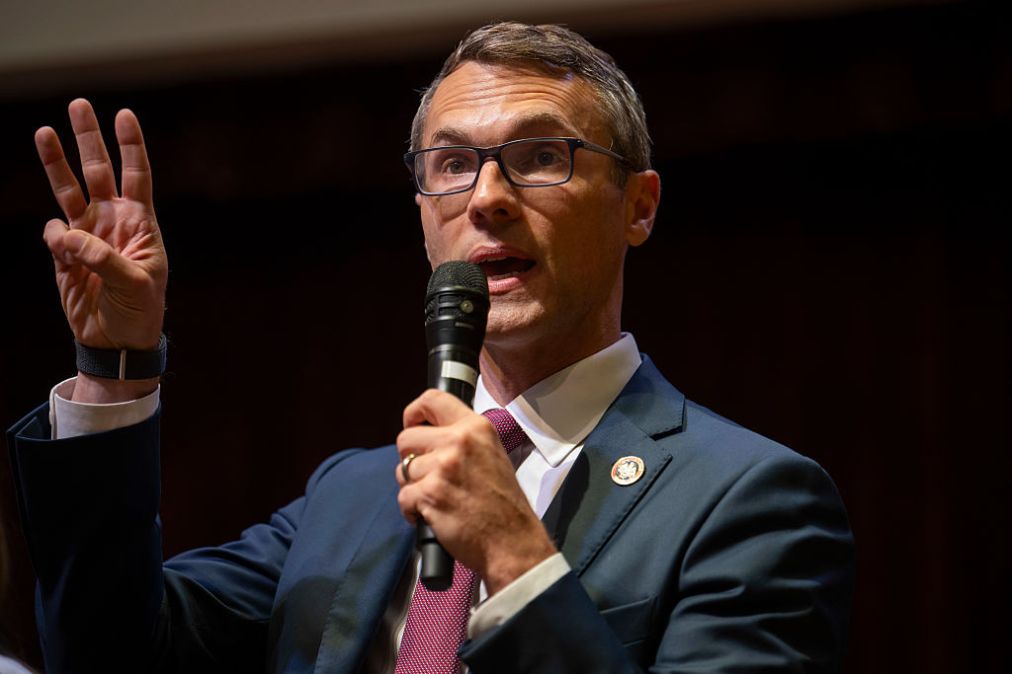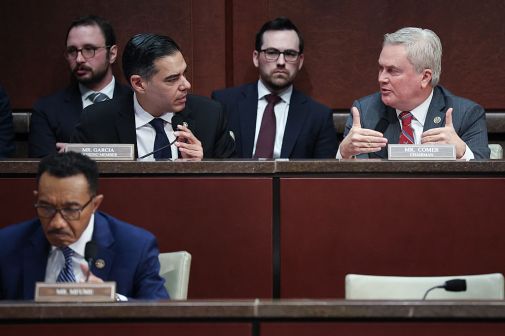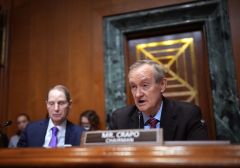James Walkinshaw dishes on DOGE, data and continuing Gerry Connolly’s IT legacy

The likely successor to the late Rep. Gerry Connolly, D-Va., hopes to continue his former boss’s commitment to federal IT reform if elected to Congress, while also gearing up to build his own legacy in the era of DOGE.
Democrat James Walkinshaw told FedScoop in an interview last week that carrying on Connolly’s federal IT advocacy is especially important to him as widespread workforce and program cuts present new challenges for the government’s IT staff and related initiatives.
While issues like IT modernization and procurement might “become less and less sexy by the day” amid other controversies in Washington, Walkinshaw said he is a “believer” that Congress should keep its foot on the pedal in this space.
Walkinshaw, who served as Connolly’s chief of staff for 11 years, is vying for Virginia’s 11th congressional seat this fall to succeed the late congressman following his death from cancer in May. He currently serves on the Fairfax County Board of Supervisors.
Using Connolly’s playbook in a DOGE era
The Trump administration’s efforts to cut government bureaucracy — and the pushback it sparked — may have politicized the idea of efficiency this year, though Walkinshaw suggested it hasn’t always been this way.
“When you look at the stated mission of DOGE to improve government efficiency, it’s hard to disagree with that,” he said.
But like many Democrats currently in office, Walkinshaw has concerns over the mechanisms DOGE is using to streamline agencies’ work, whether that be through mass layoffs or an increased reliance on automation.
When asked how he would counter DOGE’s efforts, Walkinshaw cited Connolly’s work on the Federal Information Technology Acquisition Reform Act, or FITARA, and the bipartisan process his former boss used to get the landmark bill passed.
The legislation, passed in 2014, remains the foundation for chief information officers in the federal government. Connolly continued to make it a priority in the years that followed, holding biannual FITARA Scorecard hearings and meetings and sounding the alarm this year over DOGE’s impact on the federal workforce.
“One of the things I will do … is talk about the process that we went through, that Congressman Connolly went through, to develop and then implement FITARA,” Walkinshaw said, adding that “FITARA is a perfect model of how to improve government efficiency and do it the right way.”
Walkinshaw, who was on Connolly’s staff during FITARA’s passage, said the process involved working with stakeholders and the private sector, along with federal leaders and CIOs, and building a “bipartisan coalition” that passed legislation and ensured it was implemented.
“It avoids the reckless, indiscriminate firings of talented people that we’ve seen, but it also leads to enduring savings and efficiencies in a way that the kind of rapid-fire DOGE approach doesn’t,” Walkinshaw told FedScoop.
Concerns over DOGE’s long-term impact
Taking another page out of his former boss’s book, Walkinshaw is focused on technology modernization, emphasizing that DOGE’s work is “setting us back” in this area.
“There were many years when I was on the Hill, during the Obama administration, the Biden administration and to even some extent, during [President Donald] Trump’s first term, where we had some good people in key roles, but we didn’t have good technology,” Walkinshaw said.
“We weren’t getting that cutting-edge technology into government,” he added. “What DOGE is doing is indiscriminately firing a lot of the good people who know how to make this technology work and making the federal government a much less attractive career option for highly talented, highly skilled people.”
Walkinshaw’s potential future district includes Fairfax, Reston and Vienna and is home to thousands of federal workers. Data from the Metropolitan Washington Council of Governments shows nearly 16% of Virginia’s 11th congressional district’s employed residents are federal workers.
Officials with the Trump administration say the goal is to modernize technology and bolster efficiency by treating the government more like a business, but Walkinshaw questioned whether its actual actions match the encouraging nature of many tech companies or startups.
“If a CIO knows that a modernization effort that fails or doesn’t meet a timeline is going to result in a tongue lashing before Congress or the Trump administration or DOGE, they’re not going to be willing to take those risks, and they’re just going to play it safe,” he said.
“And when you play it safe, you typically are going to operate the legacy systems that cost more money long term and have shortcomings,” he continued. “If we’re serious about rewarding innovation, I think the fear-based approach that we’ve seen from DOGE and the Trump administration actually actively discourages innovation.”
Artificial intelligence
Walkinshaw suggested he supports the use of emerging technologies in government, including AI, but expressed concerns about whether agencies have the proper training to do so.
Congress has to be “making sure that as we’re incorporating AI into the federal government, that we’re investing in the talent and the training so agencies can deploy it responsibly and effectively,” he told FedScoop, adding that “just kind of slapping an AI label on something and hoping that it will work is not an effective approach.”
The Trump administration has encouraged the use of AI to streamline government workflows, and agency heads have repeatedly pointed to automation to make up for workforce cuts.
“It’s hard to tell how much of that is smoke and mirrors and how much of that is legitimate,” Walkinshaw said. “I’ll just say, to do that effectively, you really have to have good people who understand the agency’s mission and know how to do it. And they fired a lot of those people.”
Other policy, committee goals
Congress should have an “active role” in keeping federal agencies accountable, Walkinshaw said, adding he has ambitions to serve on the House Committee on Oversight and Government Reform.
Connolly used his more than 16-year tenure on the Oversight Committee as an avenue for his technology modernization legislation, and most recently served as ranking member.
Walkinshaw said he is “hopeful” he will be placed on the Oversight Committee should he win the special election, describing it as the “key venue” for governmentwide issues. If Walkinshaw is chosen for other committee vacancies, he said he will pursue a spot on the panel in the following Congress.
The House Committee on Transportation and Infrastructure is also on Walkinshaw’s radar, given its work with technology modernization efforts at agencies like the Federal Aviation Administration.
As for other policy goals, the congressional candidate also intends to make the Technology Modernization Fund a priority, much like his former boss.
“It is a really … or could be … a very powerful tool to help agencies make those upfront investments that can produce savings and efficiencies and better outcomes,” he said.
Charting his own legacy
While Walkinshaw plans to continue several of Connolly’s initiatives, he has several policy areas he hopes to expand upon, including cybersecurity workforce development.
“How can we create real pathways for young people, for veterans, to enter that space in federal agencies?” he said. “Pre-DOGE, we had a huge number of job openings in cybersecurity fields and we still do to a lesser degree. But those positions typically require very specific skills and certifications that change regularly.”
Walkinshaw continued: “How can we create the structures and the opportunities for people who have the talent and maybe the knowledge base, but need that new certification or that new skill to be able to match with an opening or a need that a federal agency has?”
He also hopes to focus on data collection and how the government can optimize this for innovation.
“Obviously, something that has just exploded in the last five to 10 years is the volume of data that the federal government collects and has,” he said. “How can we empower chief data officers and agencies to really drive innovative ways to utilize that data?”
“That data,” he added, “represents a huge resource for the federal government and the American taxpayers, and are we taking full advantage of it to better serve the American people? I think that’s an area that deserves a lot of exploration.”






